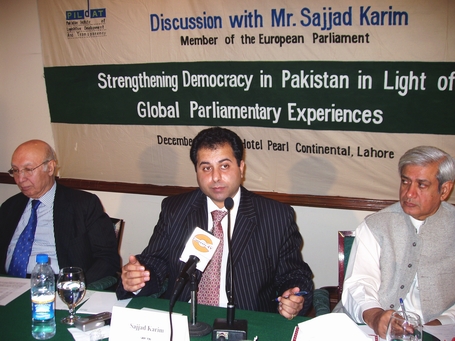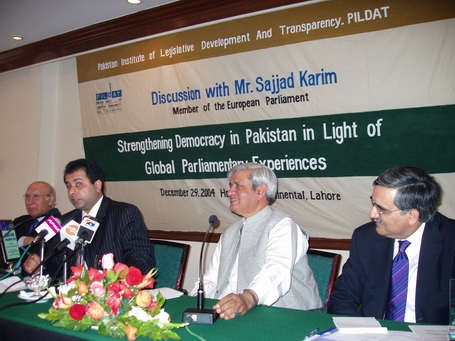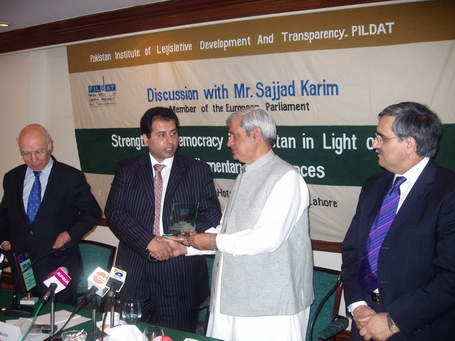|
|
| |
| EVENTS |
|
|
> Internally democratic political parties required for stable democracy in Pakistan
|
|
|
| |
�In order for democratic processes to develop in Pakistan, political parties in Pakistan need to be internally democratic.� These views were expressed by Mr. Sajjad Karim, Member of the European Parliament, on �Strengthening Democracy in Light of Parliamentary Experiences� at a Discussion held by the Pakistan Institute of Legislative Development and Transparency-PILDAT. Prominent participants at the discussion included Syed Fakhar Imam, Former Speaker National Assembly of Pakistan, Mr. Sartaj Aziz, Former Finance Minister and selected members of Punjab Assembly, civil society representatives and media persons. |
|
| |
Mr. Sajjad Karim is the first and only Member of the European Parliament who is of Pakistani Origin. Born on July 11, 1970 in UK, he was elected to the European Parliament in June 2004 at the age of 34 years as a Liberal Democrat representing North West of England. Mr. Karim is a voting member of the European Parliament�s Committee on Trade and is taking a direct interest in Pakistan�s position regarding GSP.
|
|
| |
Mr. Ahmed Bilal Mehboob, Executive Director PILDAT, introduced Mr. Sajjad Karim and said that the Discussion had been arranged in order to enable Mr. Karim to share his ideas and experiences as a European Parliamentarian and facilitate exchange of views on democratic processes and parliamentary procedures. |
|
| |
During the Discussion, Mr. Sajjad Karim highlighted that Europe is able to support and strengthen its democratic processes through an independent judiciary, free media and vibrant civil society. He said it has a political party system which has a membership base. These members decide the policies of the party. The parties are decentralised which allows more thinking to go into the policy process. A society based on meritocracy allows people to progress. Democratic systems play a key role in allowing people to move forward. |
|
| |
Addressing the issue of need for constant orientation and capacity building of elected legislators, Mr. Karim said structures were in place in the European Parliament for the development and orientation of MPs. He said that a basic level of support is provided to allow members to do the work they are elected to do. He said 51% of the members of the European Parliament were new members. |
|
| |
In response to a question regarding the West rewarding Pakistan for its support for the War against Terror and accepting President General Pervez Musharraf�s rule, Mr. Sajjad Karim said that whilst the European Parliament did not accept the way Musharraf came into power, we must recognise that his position in the country is providing stability within Pakistan and in the South East Asian region. He said that if the Western world did provide trade opportunities to Pakistan, there would be negative implications which would not be healthy. He said western democracies have to take a wider view of the situation and do not want to do anything that will create instability in the region. He said the European Parliament had recently set up a strategic partnership with India while we are also aware that we should not harm Pakistan�s basic trade infrastructure, he added. A lot of queries from the participants at the discussion related to the role of EU and the European Parliament in strengthening democracy in Pakistan through help and pressure to oust military from politics. However, Mr. Karim was of the view that democracy and internal management of it has to be reformed only through the indigenous efforts of the people of Pakistan. |
|
| |
In response to another query regarding the demarcation of roles between National Parliaments of EU and the European Parliament, Mr. Karim informed the participants that 75 % of the laws that are operating in England are passed by the European Parliament, but it is not a top down process. Subjects of legislation between national parliaments and the European Parliament are divided on the basis of the specific areas of expertise of both sides. Areas such as health, etc remain the domain of national Parliaments. Responding to a question of what lessons should the South Asian region learn from the EU, Mr. Karim said that each country of the region has to understand that its true prosperity depends on its cooperation with its neighbours. Europe has been able to achieve a unified status today because countries of Europe realised this and were willing to resolve their issues of a violent past through dialogue. Willingness to discuss positions helps resolve the continuing issues EU faces, he added. |
|
| |
Concluding the discussion Syed Fakhar Imam and Mr. Sartaj Aziz echoed Mr. Karim�s views that strengthening of democracy in Pakistan had to be achieved by indigenous efforts of the people. They offered their thanks to Mr. Karim adding that a Pakistani-origin young MP of European Parliament was a source of pride for Pakistan. Towards the end of discussion, Mr. Ahmed Bilal Mehboob invited Syed Fakhar Imam and Mr. Srataj Aziz to present a PILDAT memento to Mr. Sajjad Karim as a token of appreciation for his presence and sharing of his views at the forum. |
|
| |
|
|
| |
|
|
| |

|
|
| |
|
|
| |

|
|
| |
|
|
| |

|
|
|
|
|
|
|
|
|